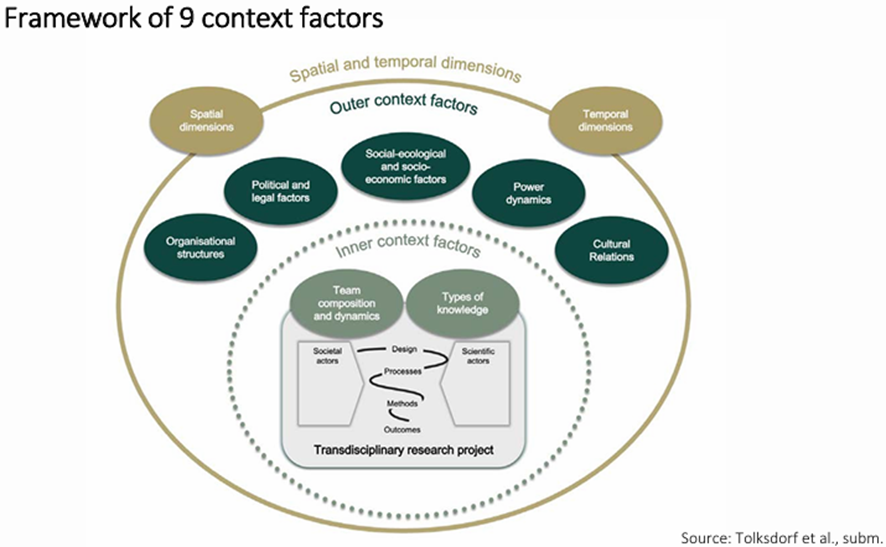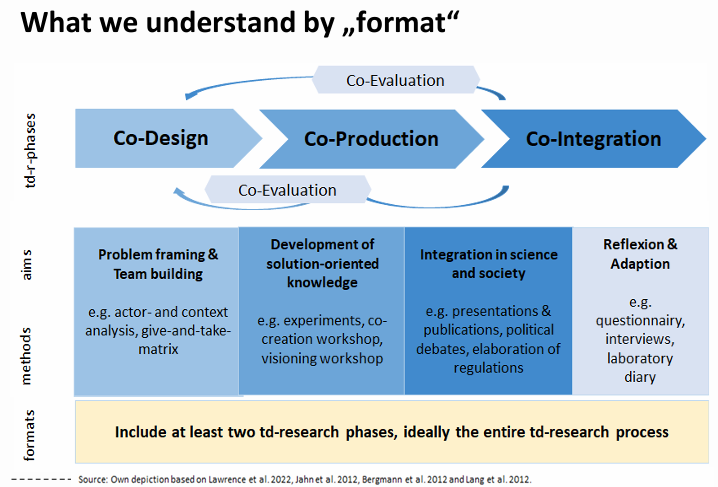Oeko-Institute together with The Institute for Technology Assessment & Systems Analysis (ITAS) at Karlsruhe Institute of Technology (KIT) hosted the Online workshop as part of the tdAcademy project, titled “On the Context-Sensitive Selection and Adaptation of Formats in Transdisciplinary Research – Towards an International Perspective”, aimed at examining how context-specific factors affect the choice of formats in transdisciplinary (TD) research. The findings contribute to ongoing research between Oeko-Institute and ITAS.
The online workshop, held on October 17, 2024, brought together researchers, practitioners, and students involved in TD projects or research. The session began with a presentation introducing the participants to TD research and elaborated on what is understood as Context through the “Framework of 9 Context Factors” and as Format with the aid of the three TD research phases, namely Co-Design, Co-Production, Co-Integration and their Co-Evaluation. Examples were furnished for the participants to provide a better understanding of contexts and formats in implementation and the criteria to consider when distinguishing between formats were shared to equip the participants for the forthcoming discussions. Critical intersection “Hotspots” that influence the collaborative impact were highlighted – namely Power Asymmetries, Trust Building and Knowledge Types delving into dedicated example scenarios elaborating their respective contexts and formats selection.

Following the presentation, participants engaged in interactive group discussions split into three different groups on Contexts, Formats and Cultural Settings, where they shared experiences and identified factors critical to their respective group’s focus. Through these discussions participants tried to address questions on identifying contexts, the defining characteristics of formats and how they make formats & methods suitable for particular contexts and how contexts & formats interact in other cultural settings. Participants in each group were guided by TD research experts from the host institutions.
A plenary discussion concluded the workshop, where participants synthesized key insights and practical takeaways for applying context-sensitive approaches in TD research. Throughout the session, participants shared observations on how power asymmetries manifest in international TD collaborations. Factors such as institutional hierarchies, funding disparities, and language barriers were noted as contributors to unequal influence among collaborators.

Participants emphasized the need for TD formats that encourage open communication and mutual respect to foster a more balanced approach among diverse stakeholders. Cultural values were also identified as influential in shaping expectations around collaboration. For example, some cultures favour consensus-based decision-making, while others operate within more hierarchical frameworks. Trust-building emerged as a priority, with suggestions such as informal meet-ups and open discussions on values and expectations to help address power asymmetries. Participants identified several contextual factors as essential for the effective selection and adaptation of TD formats. Geopolitical contexts, including political stability and international relations, were noted as significant influencers. Institutional frameworks, including policies and research agendas, also shape the structure and constraints of TD projects, while socioeconomic diversity can create challenges in resource availability and capacity, affecting collaborative work – as discussed by the participants as part of the concluding plenary session.
The hosting institutions extend their gratitude to all participants for their valuable contributions and to the organizers of the workshop for providing a collaborative platform to discuss and advance TD research practices.
